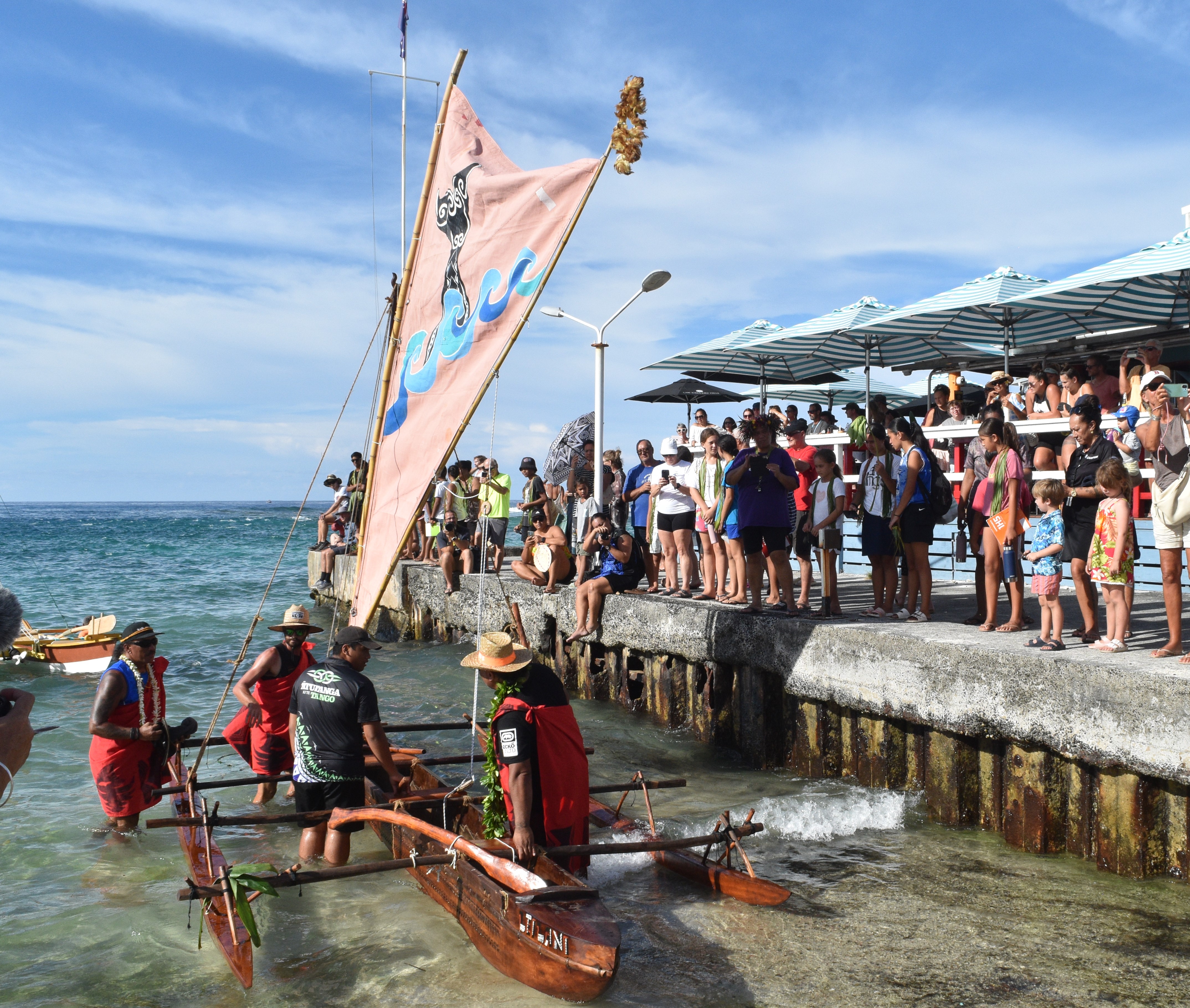Related News
 Launch of traditional canoes or Vaka in Avarua Harbour, Cook Islands. PC: Cook Islands News.
Launch of traditional canoes or Vaka in Avarua Harbour, Cook Islands. PC: Cook Islands News.
The Cook Islands Voyage Society (CIVS) last Thursday (16 Feb) set new sails with the successful launch and blessing of 9 traditional canoes built in collaboration with the USP Pacific-European Union Partnership (PEUMP) Project through the Te Mana o te Vaka initiative.
Primarily funded by the European Union (EU) and the Government of Sweden, this partnership aims to deliver traditional knowledge and skills on canoe design and building to local apprentices – addressing 1 of the 5 key areas of the USP PEUMP Project, which is improved access to fisheries and marine education and training, focused on the identified needs of communities and nation states.
A similar activity was conducted in Fiji where 9 canoes were launched in Beqa in 2021. Similar initiatives will be rolled out to selected Pacific Island countries over the next two years.
“Working together and building these types of canoes is about ensuring our tradition, ensuring an art form that actually if we don’t preserve it, we are going to lose it because there are very few people doing this now, and by doing this we ensure things continue,” said Dr Evangelene Wong, Vice President, Cook Islands Voyaging Society.
The Te Mana o te Vaka initiative was designed to strengthen capacity of and expertise in effectively responding to environmental challenges particularly, sustainable transport in the context of climate change, food security and livelihood, well-being, poverty alleviation and fisheries management.
“Capacity enhancements in the region are necessary not only for professional workers in the marine sector but also the wider community (men, women and youth) through re-establishing and strengthening traditional knowledge for management systems. This enables rights to inclusive participation coupled to sustainable livelihoods.” said Dr Debi Futter-Puati, the Cook Islands USP Campus Director.
“We have succeeded in imparting traditional knowledge to our people; however none of the graduands are master carvers yet until they keep practicing the art of canoe building.” said Ta’unga Michael Tavioni, Pacific artist and master carver leading the training.
Approximately 200 students attended various aspects of this training within the past six months. Tavioni, however recognized and acknowledged two men and three women trainees who he believes have the talent and skills of a carver.
“I treat women the same as men, like the double hulled canoe the women is equal to the man,” said Tavioni.
The Vakas will be used to teach traditional sailing, vaka care and maintenance to prospective sailors that will be using these in their island home environments. The vakas will also be used in a traditional fishing tournament organized by CIVS in April.
USP is one of four key implementing partners of the EUR 45million PEUMP Programme, which aims to promote sustainable management and sound ocean governance for food security and economic growth while addressing climate change resilience and conservation of marine biodiversity. It follows a comprehensive approach, integrating issues related to ocean fisheries, coastal fisheries, community development, marine conservation and capacity building under one single regional action. The PEUMP project is housed within the Institute of Marine Resources within the School of Agriculture, Geography, Environment, Ocean and Natural Sciences (SAGEONS).
About us
The University of the South Pacific (USP) is the premier institution of higher learning for the Pacific, uniquely placed in a region of extraordinary physical, social and economic diversity to serve the region’s needs for high quality tertiary education, research and policy development. One of only two regional universities of its type in the world, USP has 12 member countries: Cook Islands, Fiji, Kiribati, Marshall Islands, Nauru, Niue, Samoa, Solomon Islands, Tokelau, Tonga, Tuvalu and Vanuatu. USP is committed to achieving excellence and innovation for the sustainable development of Pacific Island Countries.
________________________________________________________________________________
The Pacific-European Union Marine Partnership (PEUMP) Programme addresses some of the most serious challenges faced by Pacific countries. Among these are the increasing depletion of coastal fisheries resources; the threats to marine biodiversity, including negative impacts of climate change and disasters; the uneven contribution of oceanic fisheries to national economic development; the need for improved education and training; and the need to mainstream a rights-based approach and to promote greater recognition of gender issues to ensure inclusiveness and positive changes for Pacific island people. The seven-year PEUMP programme is funded by the European Union (EUR 35 million) and the government of Sweden (EUR 10 million). It is implemented by the Pacific Community (SPC), the Forum Fisheries Agency (FFA), the Secretariat of the Pacific Regional Environment Programme (SPREP) and the University of the South Pacific (USP) in close collaboration with Non-Government Organisations and the national authorities.